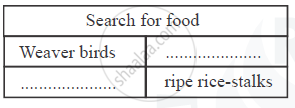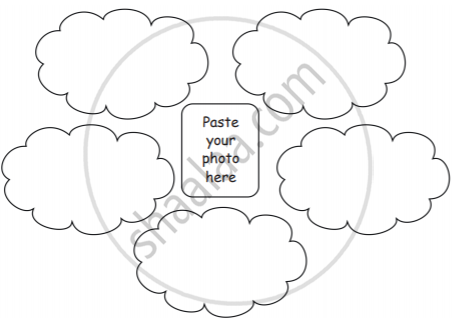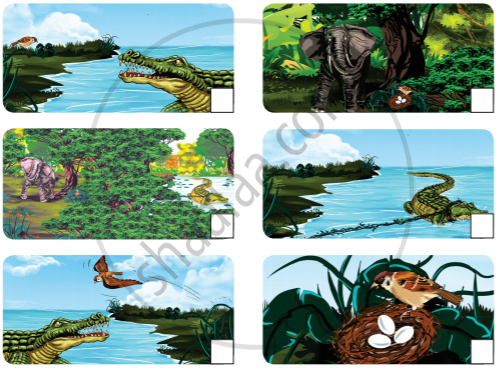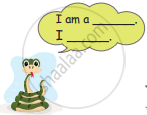Advertisements
Advertisements
प्रश्न
Read the following extract and then do all the activities that follow :
I rain into a stranger as he passed by
“Oh, excuse me please” was my reply.
He said, “please excuse me too; wasn't even watching for you.”
We were very polite, this stranger and I.
We went on out way and we said good-bye.
But at home a different story is told.
How we treat out loved ones, young and old.
Later that day, cooking the evening meal,
My daughter stood beside me very still.
When I turned, I nearly knoked her down.
“Move out of the way,” I said with a frown.
She walked away, her little heart broken.
I didn't realize how harshly I'd spoken.
While I lay awake in bed,
God's still small voice came to me and said,
“While Dealing with a stranger, common courtesy you use,
But children you love, you seem to abuse.”
A1. Order-
The incidents narrated in the extract are arranged in a jumbled manner here, Rearrange them in a proper order as they occur in the extract:
(i) The poet and the stranger went on their way saying good-bye.
(ii) Seeking excuse politely from the stranger, she went her way.
(iii) The poet ran into a stranger on the road.
(iv) The poet yelled at her daughter.
A2. Poetic device:
Make a list of rhyming pairs from the second stanza and note down the rhyme scheme of the same stanza.
A3. Personal Response:
Understanding and politeness are the essentials of out everyday life. Explain your views in brief.
A4. Creativity -
Frame two poetic lines on the following situation using a rhyming pattern with the help of clues given:
“While introducing great personalities, we praise them highly and talk about their qualities, but while speaking
about our friends we may not follow the same trend.”
While introducing great personalities, — a
------------------------------------ — a
But while speaking about our friends, — b
------------------------------------ — b
उत्तर
A1.
(iii) The poet ran into a stranger on the road.
(ii) Seeking excuse politely from the stranger, she went her way.
(i) The poet and the stranger went on their way saying good bye.
(iv) The poet yelled at her daughter.
A2.
The list of rhyming pairs from the second stanza are:
told – old, meal – still, down – frown, broken – spoken.
The rhyme scheme of the same stanza is aabb.
A3.
Human personality consists of multiple layers & stanges of formation which includes manners, behaviour, character, personality & individuality. Understanding and politeness reflects a person's behaviour and manners both. In our daily life, we have lot of ups and down because not all days are the same. So, being understanding & adapt according to the situation is essential for an individual or else he/she will not be able to survive during that time. Showing understanding in several life issues shows the maturity level of a person & can avoid several consequences arising out of it. Politeness is one's behaviour or you can say a basic manners. Whether a person is known to us or he/she is a stranger it is our duty to be polite and be kind towards every living being as this is one of the parameters where an individual's character is also judged. Also, when you are polite to everyone people around will like you & appreciate your presence in daily life. Hence, both understanding & politeness are the essentials of our everyday lif.
A4.
while introducing great personalities,
we do not check their humanities
But while speaking about our friends,
we forget half of them pretend.
APPEARS IN
संबंधित प्रश्न
Complete the following table :

Read the extract and do the activities that follow:
The duke senior and his follower were sitting down to a meal one day when Orlando rushed out from among the trees, his sword in his hand. ‘Stop, and cat no more!’ he cried. The Duke and his friends asked him what he wanted.
‘Food,’ said Orlando. ‘I am almost dying of hunger’. They asked him to sit down and eat, but he would not do so. He told them that his old servant was in the woods, dying of hunger. ‘I will not eat a bite until he has been fed,’ Orlando said.
So the good Duke and his followers helped him to bring Adam to their hiding-place, and Orlando and the old man were fed and taken care of. When the Duke learned that Orlando was a son of his old friend sir Rowland de Boys, he welcomed him gladly to his forest court.
Orlando lived happily with the Duke and his friends, but he had not forgotten the lovely Rosalind. She was always in his thoughts andevery day he wrote poetry about her pinning it on the trees in the forest. ‘These trees shall be my books,’ he said, ‘so that everyone who looks in the forest will be able to read how sweet and good Rosalind is’.
Rosalind and Celia found some of these poems pinned on the trees. At first they were puzzled, wondering who could have written them; but one day Celia came in from a walk with the news that she had seen Orlando sleeping under a tree, and she and Rosalind guessed that he must be the poet. Rosalind was happy to think that Orlando had not forggoten her, because she loved him as much as he loved her.
A1. Complete - (2)
Complete the following sentences:
(i) Rosalind was happy to think _______
(ii) The Duke and his followers helped Orlando to bring _________
(iii) Orlando pinned the poems written about Rosalind on ______
(iv) When the Duke cam to know that Orlando was a son of his old friend, he _________
A2. Write a gist: (2)
Write a gist of the above given extract in about 50 words.
Give an example from the passage that proves the crow to be an intelligent bird.
Read the following extract carefully and complete the activities given below :
A1 Complete the following :
(i) Books were found on the _____________ and ____________.
(ii) The tales are described as ______________ and __________.
|
Have you forgotten? Don't you know?
We'll say it very loud and slow:
THEY ... USED ... TO ... READ! They'd READ and READ,
AND READ and READ, and then proceed
To READ some more. Great Scott! Gadzooks!
One-half of their lives was reading books!
The nursery shelves held books galore!
Books cluttered up the nursery floor!
And in the bedroom, by the bed,
More books were waiting to be read!
Such wondrous, fine, fantastic tales
Of dragons, gypsies, queens, and whales
And treasure isles, and distant shores
Where smugglers rowed with muffled oars,
And pirates wearing purple pants,
And sailing ships and elephants,
And cannibals crouching 'round the pot,
Stirring away at something hot.
(It smells so good, what can it be?
Good gracious, it's Penelope.)
|
Notice these expression in the text. Infer their meaning from the context.
manoeuvres
Guess the meaning of the following word:
Drokba
In which language are these word found?
Combine related points.
Look for a story, a poem and a newspaper article on environment conservation and see how the style of each is different from the other.
We 'draw up a deed'. Complete the following phrase with an appropriate word.
________one's will
What was the importance of the watch to the author?
'On reading Shelley's A Defence of Poetry, the question insistently occurs why there is no similar A Defence of Science written of equal endowment.'
Certain words in the poem are in capital letters — why?
Read the following statement and mark those that apply to you.
I have a small group of close friends and have no wish to interact with anyone else.
Read the extract 'Being Neighborly' and complete the following statement:
Jo swept a path around the garden for ________________.
Think and answer in your own words.
What could be the age group of the speaker in the poem?
Think and answer in your own words.
How do parents react when they see children soil their clothes in dust and heat?
Think and answer in your own words.
What exactly does the speaker in the poem crave for?
Make a list of the preparations made for an assault on Tiger Hill.
Individual guns ___________.
The kite - Bazar in Ahmedabad, is open day and night for a week.
You might have visited a bridge. Complete the web describing the sights you could see from the bridge.

Discuss in groups and share with one another.
The daily routine of your mother and father on working days.
Select any four zoo animals mentioned in the poem. Imagine they are able to talk in English. Compose a dialogue among the four animals discussing their discomfort and illnesses.
Go through the poem and state whether the following statement is true or false.
Planners paint beautiful pictures of the upcoming changes in the city that charm the citizens.
How do we realize that animals are not feeling well?
Read the expression:
‘the blueprint of our past’s tomorrow’. Consider in a group why the poet has not mentioned ‘the present’. It is because of the planners who have possessed our ‘present’ in order to change ‘our past’ into the ‘future’ they desire. Go through the poem and write the lines which support this thought.
- The buildings are in alignment with the roads which meet at desired points.
- ____________________________________________
- ____________________________________________
- ____________________________________________
- ____________________________________________
- ____________________________________________.
Expand the idea inherent in the following proverb :
One should eat to live, not live to eat - Franklin.
Dos and Don'ts for Email Etiquettes. Discuss and add one or two Dos and Don'ts on your own.
| Sr. No. | Dos | Don'ts |
| 1. | Have a clear subject line. | Don’t forget your signature. |
| 2. | Use a professional salutation. | Don’t use humour and sarcasm. |
| 3. | Recheck your e-mail. | Don’t assume the recipient knows what you are talking about. |
| 4. | Keep private material confidential. | Don’t punctuate poorly. |
| 5. | Keep your email short and flawless. Stay concise. | Don't hit 'Reply All'. |
| 6. | Check your attachments before sending them. | Don’t think that no one but the intended recipient will see your email. (No predictions) |
| 7. | Include your name or a signature with additional details and contact information. | Don't forward emails without permission. |
Fill in the gap, choosing a word from the bracket to make an appropriate comparison.
(tall / quiet / humble / merry / busy / slippery / fast / sly / slow / big)
as ______ as a snail
Language Study: Degrees of comparison.
We use different forms of adjectives and adverbs to show comparison. They are known as degrees of comparison.
- Positive: Mangesh was as strong as Ravi.
She is as tall as her sister. - Comparative: Mangesh was stronger than other players.
She is taller than her sister. - Superlative: Mangesh was the strongest player in the team.
Their sister is the tallest amongst the three.
Imagine you are the Crane. What actions and words of the Peacock would you not like? Write about it in short.
Read the poem aloud. Recite any stanza of your choice from memory.
Make a list of functions/events/programs/activities organized in your junior college. Choose three events and plan a program schedule of your own. Prepare a script as well to show the associating role of the compere for a particular event. Make your own sequence and design a template for the same.
Define drama.
Enlist a few reasons for watching a drama live on the stage.
Can you name different types of fabrics? Which is the most expensive fabric you know? Talk to your parents or to a textile shop assistant. Collect samples of as many types as you can and paste them into your scrapbook. Name each type.
Comment on the given statement after reading the given dialogue -
But when I saw a man in trouble, I could never help trying to set him out of it.
Its human to help others. Here the statement tells us that ____________________________.
Name the type of fabric closely associated with Mahatma Gandhi, the Father of the Nation. Why did Gandhiji want all of us to use this fabric?
Discuss and write 1-2 lines about the following,
Why Bushi told Yonamine not to travel at night.
Write about the various wheel-like objects you see at home, in school, and on the road.
Expand the following ideas in a paragraph or two:-
Where there is a will, there is a way.
Discuss what a friendly and good-natured peacock would say to a crane. Write his speech. (5-8 lines.)
Write a short note on the following:
Veterinary Science in Ancient India.
Write a few lines about each character.
Think and answer:
Does the last line make you happy or sad? Why?
Discuss:
In the story, human settlements are mentioned but not cities or villages. Why is it so?
You want to start human settlement somewhere else other than the earth, in the universe. Will you select a star or a planet? Why? What features supporting life will you look for? Try to find answers to such questions and make a presentation using scientific information and your imagination.
Choose the appropriate phrase to insert in the gap, to make the sentence meaningful. Use the appropriate form of the verb.
I ______ just as I was to receive my Report Card.
Choose the appropriate phrase to insert in the gap, to make the sentence meaningful. Use the appropriate form of the verb.
Sorrowful times are ______ darkness.
Find from the Internet and write down.
In which century did William Shakespeare write his famous plays?
‘And calls our Best away’ is a gentle way of expressing the unpleasant idea of a loved one dying. It is an example of euphemism. Think and write down 3 or 4 ways in which we can express the idea of ‘death’ in a tactful and gentle manner.
- _________________
- _________________
- _________________
- _________________
The table-tennis set was gifted by ______.
Form groups of 6-8. One person (leader) chooses one item - a picture, a paragraph, or a lesson from any one of the 9th standard textbooks and writes the reference on a slip of paper, and folds it. Others ask him/her questions and try to guess what it is, from his/her answers. Follow the rules given below.
- The maximum number of questions the rest of the group can ask is 20.
- You cannot ask a direct question like ‘What do you have in mind?’
- You can ask ‘Wh-’ questions or ‘Yes/no’ questions.
- The leader has to give truthful answers.
The Principal turned out to be a very ______ lady.
Say whether you agree or disagree.
The children would have behaved well on the train if their aunt had scolded them harshly.
Fill in the blank choosing the appropriate word/idiom from the lesson.
The ______ solved the mysterious crime.
What did the husband want to do with the extra milk?
List 5 of the sounds that you like.
Name the following.
Scored the first goal in the match.
Name the following.
Did not let the passes go waste.
What difficulties do the people in the play face in the morning?
Form groups of four or five.
Try to find the answers to the following questions through observation and by talking to your teachers, parents and others. Discuss your answers in the group.
- How is waste generated?
- How is it removed or cleared?
- How can we help in the task of clearing or removing garbage?
Rewrite the following line in your own words.
'Never one comes flying by
But will flutter down to drink.'
Write what the poet is doing.
Does the poet like the experience?
Write the line which tells us about it.
Which event in the story tells us that the lion was brave?
Look at the photographs on textbook pages 19-20 carefully and imagine the following:
- The colours, shape, size, actions, etc. of what you see in the picture.
- The sound/sounds you may hear at the scene of the photograph.
- How the different things, birds, animals, etc. in the picture feel to the touch.
- The smell / smells you may smell at the scene of the picture.
- The taste of what you see in the pictures.
In short, let your imagination include oil your five senses.
Now, write short descriptions of any 8-10 of your choice.
Remember to make use of your senses (one or more!) when you describe a photograph. You will find the following words and phrases useful. You may also use other words you know.
What mistake did the man in the moon make?
Share a memorable trip from your life
Prospero ordered Ariel to bring ____________ to his place.
Identify the character or speaker.
I will tie you neck and feet together.
What were the various sounds the brothers heard when they went downstairs?
What do you understand by the mother’s act of throwing the shoe?
What are the three rules given by the bird?
Departure was delayed because of the author.
From the poem ‘The Grumble Family’ what kind of behavior does the poet want the readers to possess?
Find a sentence/word from the text which express the following.
One of the qualities of the teacher.
Who told the children the story about the ghosts on Haunted Hill?
How did the children react when they met each other at the ruins?
What kind of a life do you want to lead in this world?
Write the names of the characters in this story.
1. ______ 2. ______ 3. ______
Find out the rhyme scheme employed in the fourth stanza.
He preferred handling mail by himself.
Read the sentences and number them in correct order.
|
1. He wished to have Gopal with him. |
|
|
2. Salim felt that it should come from within. |
|
| 3. He thought he wouldn’t be able to finish it. | |
| 4. The old man worked tirelessly on the sculpture. | |
| 5. He realized that Gopal must learn to carve the finer details. | |
| 6. He had a strong wish to finish it in time. | |
| 7. Over days, he felt very weak. |
Read the following lines and answer the questions.
It’s part of his hours, his days and his years,
Back of his smiles and behind his tears.
What does ‘tears’ mean?
Why did the author leave town?
Work in groups of five. Tell the story in ten sentences.
You can begin the story like this:
The author’s Grandfather served in the Indian Forest Service.
After his retirement he built ______ Now continue the story. Each one should say one sentence.
What does the peepul do?
How can you balance your academic goals and your passion for sports or arts?
Merlin was thrilled when the school arranged the trip because ______.
Read the lines and answer the question given below.
Here is a child who clambers and scrambles,
All by himself and gathering brambles;
- Where do you think the child is?
- What does ‘gathering brambles’ mean?
Gulliver took the small creatures in his hand and crushed them.
How did Santhosh spend his time in the river?
What is Amar Jawan Jyoti?
How should we treat everyone?
Jaswantgarh is named after the Indian soldier ______.
What is the main idea of the story?
What was his master’s advice?
How were her strokes?
What did the five friends call themselves?
What was the message on the chit?
Where does the scene take place?
List out the questions to which you seek answer using 'Why?'

The official and his wife liked______.
______ lies stretching in the river.
______is next to parents in care.
Number the pictures in the correct order of the story.

_____ fights with everyone in school.
Why did Jana chase the squirrel?
What kind of water did Divya use to brush her teeth?
What did the children buy with money they have?
Name the animal and sound it makes.

Which problem do you think you can solve with art? How?
The Delhi government did not allow blind children to study Science after ____________.
Finally, ______, he got permission to study Science.
If the fisher draws his net soon, he won’t get ______ in the net.
What happens when the day is over?
Choose the right word.
Chintha Chettu is a tamarind ______.
Choose the right word.
“Eat the leaves of the tamarind tree, and you’ll also sing like ______.
What did he call his puppet?
How should teenagers guard against cyber crimes?
Read the following passage and do the activities:
A1. Fill in the blanks: (2)
- ______ percent of our daily communication is non-verbal.
- Eye contact is another type of ______ communication.
- Frequent blinking is a sign of the person feeling ______.
- One can readily detect _______.
|
According to some experts, a staggering 93 percent of our daily communication is non-verbal. Facial expressions are easy to decipher. One can readily detect happiness, sadness, anger. Physicians can tell a patient is doing well (or not) by looking at his/her face. Eye contact is another type of non-verbal communication, which can tell a lot about the other person. The eyes convey a range of emotions-happiness, sadness, boredom, surprise, confidence .......... even emotional interest. Staring at someone's forehead may intimidate the recipient, staring at the mouth is sometimes interpretated as a sign of emotional interest. In fact, staring into someone's eyes is a sign of lying, and so is looking away. In certain cultures, lack of eye contact is taken as a sign of respect. If body language is to be defined, it is a combination of facial expression, gestures, eye contact, body movements and posture and voice. Frequent blinking is a sign of the person feeling distressed or uncomfortable. If the pupils are dilated, it ofter indicates interest, even emotional interest. The lips also reflect our body language, and lip biting indicates worry and/or anxiety; tightening of the lips may be an indication of disapproval. Slightly turned-up lips indicate happiness and slightly turned-down lips indicate sadness. |
A2.

A3. Find the antonyms of: (2)
- verbal × ______
- entertaining × ______
- sender × ______
- comfortable × ______
A4. Do as Directed: (2)
- The eyes convey a range of emotions. (Frame a 'Wh' question in order to get the underlined part as answer).
- Physicians can tell about a patient's wellness. (Rewrite using 'able to')
A5. Personal Response: (2)
Non-verbal communication plays an important role in our daily life. Comment.
